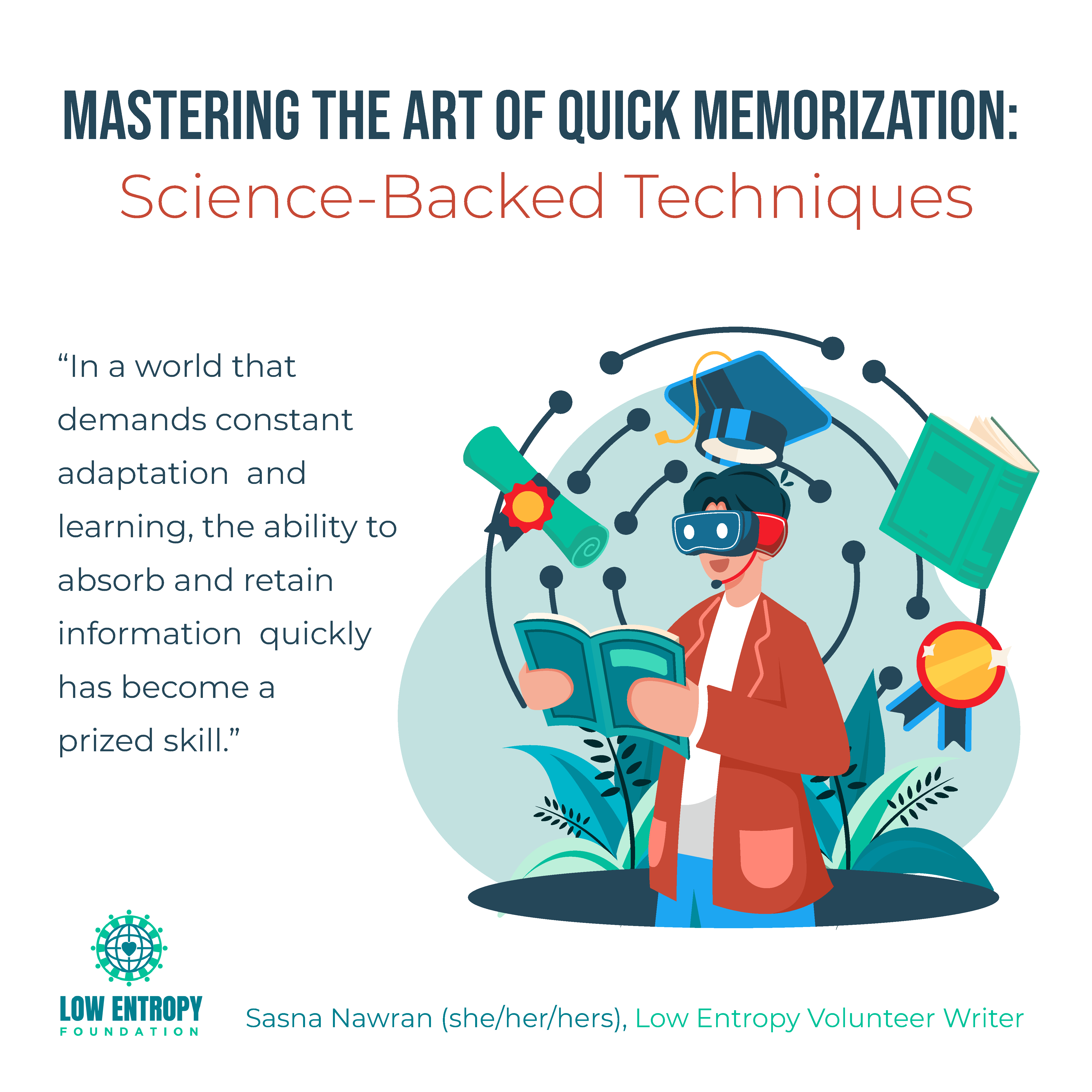Mastering the Art of Quick Memorization: Science-Backed Techniques
September 1, 2023

Sasna Nawran (she/her/hers), Low Entropy Volunteer Writer
In a world that demands constant adaptation and learning, the ability to absorb and retain information quickly has become a prized skill. Whether you’re a student aiming to excel in exams, a professional striving to stay ahead in your field or simply an individual seeking to enhance your cognitive abilities, the art of rapid memorization can make a remarkable difference.
But is there a science to it? Can you truly enhance your ability to memorize quickly?
Keep reading for the answers.
The Science Behind Memorization
The memorization process is characterized by three major processes: encoding, storage, and retrieval.
- Encoding is the process through which information is learned. It can be through visual cues, sounds or emotions.
- Storage refers to the amount of information stored in your brain, how long it is stored and where it is stored. There are two types of storage: long term and short-term. Short-term memory lasts between 15 and 30 seconds, and long-term memory can last indefinitely.
- Retrieval is the process of accessing the stored information.
Simple Techniques to Memorize Quickly
- Active Engagement and Visualization
Engaging with material actively can significantly enhance your ability to memorize quickly. Rather than merely reading or listening, try to create mental images and associations that connect the information.
Visualization aids in encoding information into your memory by creating a more robust neural network.
Research by cognitive psychologists has shown that when you visualize concepts or information, you are essentially creating a mental map that helps your brain recall details more efficiently. This technique is particularly effective when studying complex topics, foreign languages or lists of items.
- Chunking
Chunking involves breaking down large pieces of information into smaller, manageable groups, or chunks.
This technique leverages the brain’s capacity to remember around four to seven pieces of information at a time, known as Miller’s Law. By organizing information into meaningful clusters, you can exploit this natural cognitive limit and make it easier for your brain to retain and retrieve the data.
A classic example of chunking is seen in phone numbers. Instead of memorizing a string of individual digits, we often remember phone numbers as three or four chunks (e.g., 555-123-4567). Research supports the effectiveness of this technique in various memory-intensive tasks.
- Spaced Repetition
Spaced repetition is a method that involves revisiting and reviewing information at increasing intervals over time. The idea is to refresh your memory just before you’re about to forget, which reinforces the neural pathways and leads to more durable memorization.
This technique is rooted in the spacing effect, a psychological phenomenon where information is better retained when learning episodes are spaced out over time.
Research in cognitive psychology demonstrates that spaced repetition is highly effective in enhancing long-term retention, making it an essential tool for rapid memorization.
- Mnemonic Devices
Mnemonic devices are memory aids that help you remember information through creative associations. These associations can be in the form of acronyms, rhymes or vivid mental imagery. Mnemonics tap into your brain’s ability to recall information based on the context or cues you create.
Studies have shown that using mnemonic devices can significantly improve memory retention and recall. This technique is particularly valuable when memorizing lists, sequences or items that lack inherent structure.
- Active Recall and Testing
The process of actively recalling information from memory, often through self-quizzing or practice testing, has been found to enhance memory consolidation. Rather than passively rereading your notes, challenging yourself to retrieve information from memory strengthens the neural connections associated with that information.
Research conducted in educational psychology has consistently demonstrated the efficacy of active recall and testing as a learning strategy. This technique not only boosts immediate memory performance but also leads to better retention over the long term.
- Mindfulness and Sleep
Mindfulness practices, such as meditation, can positively impact memory and cognitive function. Engaging in mindfulness exercises can help reduce stress and improve focus, which in turn supports effective learning and memory retention.
Sleep is also a crucial factor in the memorization process. During sleep, your brain consolidates and organizes newly acquired information. Research indicates that getting adequate, high-quality sleep is essential for memory formation and retention.
Conclusion
As we live in a world where information is abundant and time is limited, rapid memorization is a potent skill. By employing the above techniques, you can significantly enhance your ability to memorize quickly and effectively. Remember, quick memorization is not just a talent reserved for a select few, but a skill that can be cultivated by anyone with the determination to learn.
—
Leave your thoughts for Sasna in the comments below. You can also follow us on Facebook, Instagram, TikTok, Twitter and YouTube to stay up-to-date with Low Entropy news!
GET INVOLVED
At Low Entropy, we believe changing the world starts with changing ourselves.
Founded in 2015, Low Entropy Facilitates conversations that encourage diversity and promote inclusivity.
We understand that life can be confusing at times. It can seem challenging and sometimes you may feel like no one really “gets you.” We offer an opportunity to connect with others who have the capacity to understand you.









